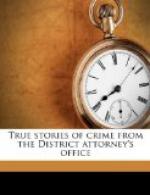“Matilda, there is nothing else—we must sell our violin!”
“Even so!” she answered, turning away her face that her husband might not see the tears. “As God wills.”
The next day “The Duke of Cambridge Stradivarius” was offered for sale by Victor S. Flechter, a friend of Bott’s, who was a dealer in musical instruments at 23 Union Square. It so happened that Nicolini, the husband of Adelina Patti, was ambitious to own a genuine Stradivarius, and had been looking for one for a long time, and, although he was but an indifferent player, he had, in default of skill to perform, the money to buy. The matter was easily adjusted by Flechter, and Nicolini drew his check for the sum specified, which, properly certified, was tendered to Bott. But Bott had never seen a certified check and was unaccustomed to the ways of business.
“If I part with my violin I must have real money—money that I can feel—money that I can count. It was that kind of money that I paid for my violin,” said he doggedly.
Nicolini, in a rage, believing himself insulted, tore the check to bits and declared the transaction at an end.
Now the price agreed upon for the violin had been forty-five hundred dollars, of which Flechter was to receive five hundred dollars as his commission, and when, through old Professor Bott’s stubbornness, the sale fell through, the dealer was naturally very angry. Out of this incident grew the case against Flechter.
The old musician was accustomed to leave his treasured instrument in the lowest drawer of his bureau at the boarding-house. He always removed it before his pupils arrived and never put it back until their departure, thus insuring the secrecy of its hiding-place, and only his wife, his sister-in-law, Mollenhauer, a friend, and Klopton, a prospective purchaser, knew where it lay.
On the morning of March 31, 1894, not long after the Nicolini incident, Bott gave a single lesson to a pupil at the boarding-house, and after his midday meal set out with his wife for Hoboken to visit a friend. The violin was left in its customary place. It was dark when they returned, and after throwing off his coat and lighting the gas the old man hastened to make sure that his precious violin was safe. When he pulled out the drawer it was empty. The Stradivarius was gone, with its leather case, its two bows and its wooden box.
Half distracted the musician and his wife searched everywhere in the room, in closets, under beds, even behind the curtains, before they could bring themselves to admit that the violin had in fact disappeared. Frantically Bott called for Ellen, the servant girl. Yes, there had been a caller—a young man with dark hair and a small, dark mustache—at about five o’clock. He had waited about half an hour and then had said that he guessed he would go. She had not noticed that he took anything away with him. In his despair the old man turned to his old friend Flechter, and the next day the dealer came to express his sympathy. He urged Bott to notify the police of the theft, but the old man was prostrated with grief, and it was the wife who, with Ellen Clancy, finally accompanied Flechter to Police Headquarters. The police had no idea who had taken the old fellow’s fiddle, and did not particularly care anyway. Later they cared a good deal.




